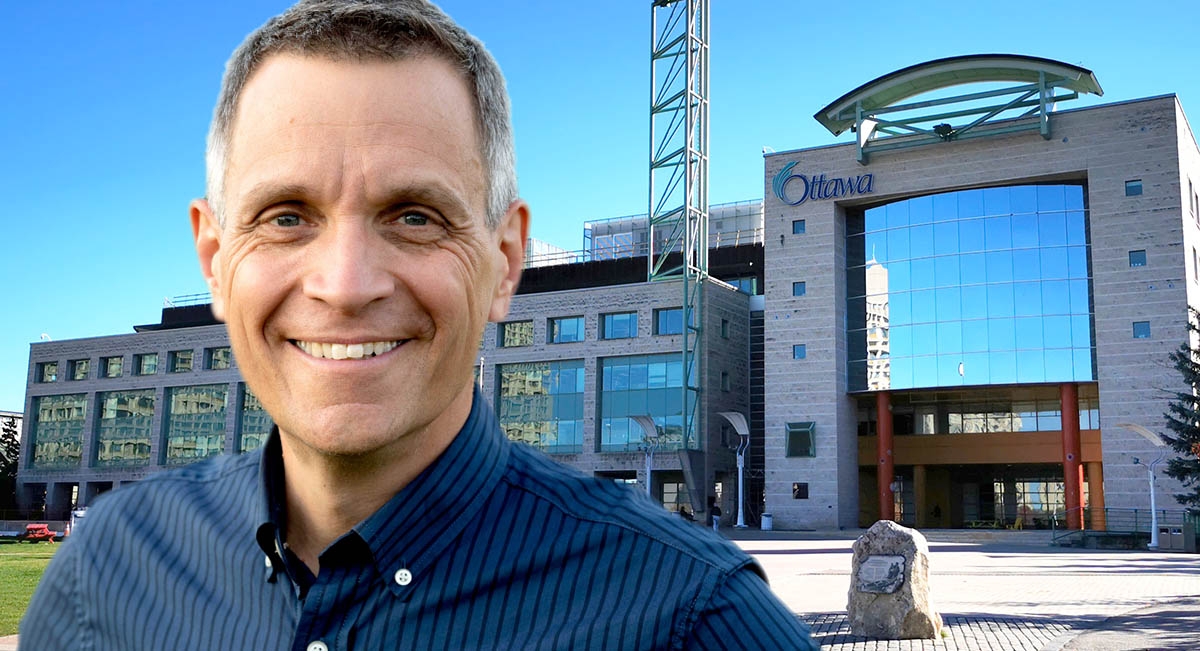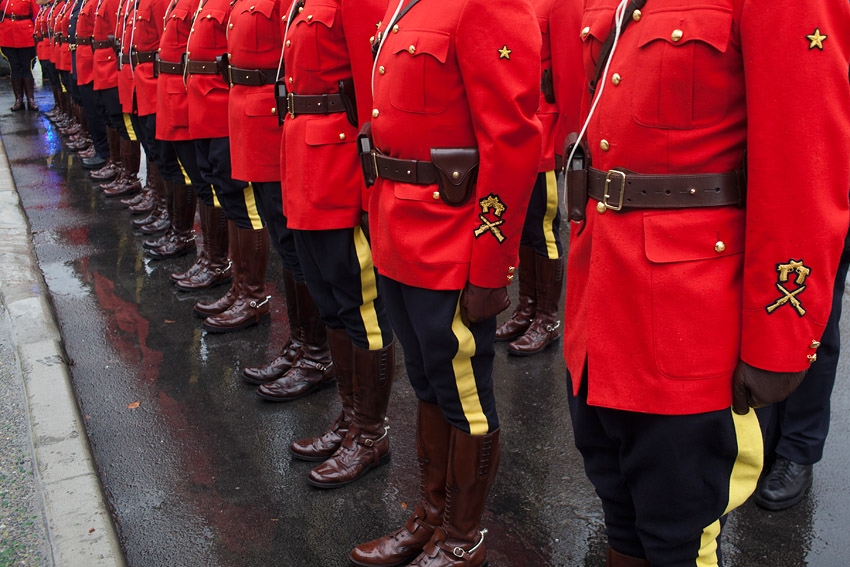
The sensible centrist – Mark Sutcliffe makes his move for mayor.
Mark Sutcliffe is a familiar presence and voice in Ottawa. He has deep roots in the capital as the successful entrepreneur and CEO of Great River Media, publisher of the Kitchissippi Times and Ottawa Business Journal. He has a reputation as a thoughtful, informed, and considerate person with great business savvy. Sutcliffe cut his teeth in local programming with Rogers Ottawa, both behind and in front of the camera, where he hosted and produced several successful community programs.
In addition to his print and television work, he has been a popular radio host, first with CFRA for several years, before moving to his slot on 1310 am. Sutcliffe has been interviewing politicians, civil servants, NGO community leaders, fellow entrepreneurs and business executives for more than 25 years and knows the city like the back of his hand. He has applied the lessons he learned in those interviews to his own businesses and to the exceptional amount of charitable work he has done in the National Capital Region for over three decades as a volunteer, activist, and community leader. He is a member of the Order of Ottawa and was named the United Way’s ambassador of the year. He has served on the boards of more than a dozen organizations, including successful terms as Chair of the United Way and the Ottawa Board of Trade.
His recent announcement that he was running for mayor made a big splash in the local news and was met with great enthusiasm by the local business community and many community groups. In short, he has made it a race!
Sutcliffe told Ottawa Life Magazine that his decision to run was one he didn’t expect to take. He assumed that several city councillors would vie for the job left open by departing Mayor Jim Watson. In the end, they didn’t, and Sutcliffe felt there was a need for a sensible centrist in the race. Sutcliffe believes he can bring a fresh perspective to Ottawa city hall. His key opponents in the race are former Mayor and MPP Bob Chiarelli and Councillor Catherine McKenney.
Ottawa Life Magazine talked to journalist, entrepreneur, and mayoral candidate for 2022, Mark Sutcliffe.
Ottawa Life Magazine: What is your transit policy for Ottawa, and how would you improve OC Transpo service?
Mark Sutcliffe: Let’s start with light rail; a lot of issues have come to light. We need to listen to the recommendations that come out of the inquiry and adapt as many as we can. Then, we need to fix phase 1 of the LRT and get phase 2 built. We’ll have to fight hard for the funding to get phase 3 completed but to do that, we’ll have to show we’ve learned our lessons from phases one and two. We’ll have to do all of this because people have lost confidence in the system, and you can’t encourage people to take the bus or the train if they don’t have confidence in the system. It doesn’t matter what the price of transit is. If they (citizens) don’t feel like it's going to work for them, they’re not going to use it. The number one factor in driving ridership is the reliability of the service and its effectiveness of it. We also have to look at all of the issues with the bus service that supports the lite rail network. There’s been a big reallocation of resources towards rail, which is understandable, but we have to make sure the bus system is still good for the neighbourhoods that don’t have trains coming through them. Vanier is one of those neighbourhoods, for example. We have to have a way to connect the trains to reliable bus service. Even if we get the funding for phase three, the people of Kanata, Stittsville, and Barrhaven will still have to use buses for the foreseeable future while phase three is secured and constructed, and that service has to be reliable. I’ve talked to people in all of these communities who have concerns about the service, so we’re going to have to make it better.
Ottawa Life Magazine: You’ve stated that you're against free transit for all riders and that the city shouldn’t be spending $900k on looking into it. Can you expand on why you are opposed to universal public transit?
Mark Suttcliffe: To begin with, let’s get back to my previous answer, which is if you want people to use public transit, you have to make it a great service. People will not use a terrible service because it is free. By the way, I’m not saying that Ottawa’s transit service is terrible; I’m saying on principle that people will not use an inadequate service if it’s free. We already have an Equipass, and perhaps that program could be expanded. We already have ways to ensure that disadvantaged people in our community, the vulnerable, students, young people, and seniors, have access to reduced fairs or free transit. I would look at expanding that potentially in some cases. We don’t want cost to be an issue for the most vulnerable people in our community. As I said, I use public transit all the time; I’m willing to pay for it, I can afford to pay for it, and I should pay for it. It’s not fair to somebody who lives in another part of the community where the transit service isn’t as good and not as reliable to have a $500 – $700 increase on their property tax bill so that I can use transit for free when they’re not using transit at all. That’s not fair, and it is not equitable. We can expand and improve how we look after the vulnerable, including potentially expanding, but we don't have to make it free for everyone, and it will not lead to good outcomes if we do make it free for everyone. We won’t have the resources we need to improve the system if we aren't charging people who can afford to pay for transit if we're not charging them fares.
Ottawa Life Magazine: Do you think Ottawa should continue to pursue the usage of the private-public P3 contracts (used for the building of the O-Train Confederation Line) for major infrastructure projects?
Mark Sutcliffe: I’d like to wait and see what the recommendations are of the inquiry. I think there are a lot of different ways to structure a deal to get public transit built and to do other initiatives in the community in principle. I don’t think that any one way of doing things is bad. There are lots of different ways to approach things. It just all comes down to how you do it and what the terms are. So again, I’m curious to see what the recommendations are from the inquiry, and there are clearly things about the way this deal was structured that were wrong, but we don’t know yet whether it was the structure of the deal or the fact it was a public-private partnership, to begin with. There have been lots of successful public-private partnerships in other areas, so conceptually, it may not be an issue of the factor of it being a public-private partnership as opposed to the kind of partnership that was struck and the deal that was arrived at.
Ottawa Life Magazine: Do you have any comments about how the mayor's office and Council handled the LRT outage last fall?
Mark Sutcliffe: I don’t want to get into evaluating the job that people have done because that’s looking in the past, and I’m looking in the future. This election is about the next four years and not about the last four years. I will say I think one of the issues we’ve had that has led to this situation is, and I wrote a column about it in the Ottawa Citizen four years ago, the current city council was very much a group of people who were promoting light rail rather than scrutinizing light rail. In the last municipal election, it was all about getting everybody excited about light rail, not taking a close look to make sure we were getting value for money and the service we had bought and paid for. I would like to see the Council, when it makes a major decision like spending billions of dollars on light rail, scrutinize the implementation of it and be a real oversite committee for the implementation of a major infrastructure project rather than just be a booster of that project.
Ottawa Life Magazine: With the announcement that the Senators will eventually be moving to a facility yet to be built at Lebreton flats, how do you, as mayor, intend to proceed so the project does not take 10 to 20 years to complete?
Mark Sutcliffe: There’s obviously a lot of players involved in that, including the Senators, the National Capital Commission and the City of Ottawa. The city has to do its part, and I think, in the long run, it’s in the best interest of the community to have a downtown arena. At the same time, I think we have to be mindful of the fact that the Canadian Tire Centre is a major economic driver in Kanata, and we need to have a good plan for what’s going to replace it there. Also, how we’re going to use that site if the Senator are no longer playing at that facility? Before the Senators move downtown and before the city agrees to anything, we need to have a solid plan for what’s going to happen to that site and how it won’t become a negative for the people of Kanata. In terms of Lebreton Flats, the city has a role to play. I think the city can be a convenor, driver of things, and facilitator. Obviously, there will be some services the city can deliver to that site. It will be huge for light rail; it’s adjacent to two light rail stations and is ideally located to take advantage of and increase the use of light rail. The city has a role to play in that, but the city is not driving it alone, it’s going to be in collaboration with the Senators and the National Capital Commission.
Ottawa Life Magazine: One of the big issues that came to the forefront, first with last year's budget and then with the "freedom convoy," was Ottawa's Police Services Board. Most of the Police Services Board resigned or were fired by the province, and our then Police Chief Peter Sloly resigned. If elected, would you keep Interim Chief Steven Bell on as the head of the Police Service, and what are your plans for the Ottawa Police Service and the Ottawa Police Services Board?
Mark Sutcliffe: So there’s a lot there obviously being a multifaceted question. It’s going to be up to the Police Services Board to choose the next police chief. That’s the way the process works; it's not up to the Mayor. I think it’s a really important time for the Ottawa Police Service and the relationship between the police and the community. There have been a lot of issues, not just the convoy, that have raised questions about governance and oversite of the police services that have caused doubt and uncertainty in the minds of Ottawa residents, particularly racialized members of the community and disadvantaged people in the community. I think we need to take a step back and look at policing in general. We need to have a safe and secure community for everyone; that includes policing, but I think there's room for us to take a different approach to some issues. I’m a big proponent of developing solutions, so that police officers are not the ones who are called to issues related to mental health and addiction as they currently are now, that there are people with different training potentially who could respond to those calls more effectively. I think we need to do a lot to restore people’s confidence in the police service, and we can do it, but it’s going to take a lot of creativity and hard work.
Ottawa Life Magazine: On your website, one of the things you said was that you wanted a tough-on-crime approach to policing in Ottawa. What does that look like to you?
Mark Sutcliffe: Tough on the causes of crime. When I say tough on the causes of crime, that’s obviously different from tough on crime. I’ve done a lot of volunteer work in the mental health area and in communal housing, and in other areas related to social services in our community and what becomes more and more apparent all the time is that a lot of crimes result from social issues; people not having enough resources, people living in poverty, homelessness, addiction, mental health issues. As a community, we have to ensure that people are not being left behind. There are many cases where people end up in a hospital or they end up in the criminal justice system and in a very expensive way to society because of an issue that could have been treated more proactively and at a lower cost to society with less disruption for the individual if we were doing a better job providing social services and support for substance use disorder and mental health issues. I think we need to start being a lot more aggressive as a community in resolving the issues that lead to crime rather than simply taking a tough-on-crime approach.
Ottawa Life Magazine: The ByWard Market area has had a marked decline, and rampant addiction and crime have become a significant concern among residents and workers in the area. Do you think there's a problem with addiction, homelessness and crime in the ByWard Market and do you have a strategy to do anything about it if you're elected?
Mark Suttcliffe: I think there is a problem, and I’ve heard from a lot of people, including residents and merchants that they’re very concerned about the future of the area. I will have in my platform some thoughts on and solutions for the ByWard market. I don’t have everything in place right now, so the platform is not complete; we're building it. I will say one of the key issues that we need to address in the community is supportive housing, I’ve talked with people who work very hard on these issues to do with mental health, homelessness and addiction and one of the challenges we have as a community is we don’t have enough housing, enough affordable housing, and enough supportive housing available to people who can’t just be removed from a situation and put in a home by themselves but need resources to help them. That’s got to be part of the solution, to realize that if we are helping somebody with an addiction or mental illness, that the resources are there to help them, so it doesn’t become a health issue or a public safety issue again.
Ottawa Life Magazine: The price of rent in Ottawa and the cost of owning a home have gone up drastically in the last few years. In 2020, Council declared a housing emergency. What would you do as mayor to alleviate the pressure on residents who can't find affordable housing?
Mark Sutcliffe: I don’t have a platform yet. I'm working on it, so I don’t have a specific answer for you on that. What I will say is it’s a huge issue, and it’s a huge issue. There are too many people being left behind, and we don’t have enough affordable housing in our community. Honestly, it breaks my heart that in a community and a city as prosperous as Ottawa is and in a country as prosperous as Canada is that we still can’t get this right and still can’t find enough places for people to have somewhere warm and safe to sleep every night and that there are people who don’t have enough food in a city that has enough food. It’s a big priority for me to work on these issues, I know a lot of really smart people have been working on them for years, but affordability has to be a huge priority going forward as we're becoming a bigger and bigger city and if we're not careful, we are going to have some huge issues with more and more people not being able to afford to live here.
Ottawa Life Magazine: Catherine McKenney's campaign has said that the city needs what is essentially an environmental auditor to see how each city plan impacts climate change. What do you think of that idea, and what would you do about climate change as mayor of Ottawa?
Mark Sutcliffe: This will be part of my platform, which is not complete yet, but I think that climate change is a huge priority, and the city can do a lot. There are a lot of creative ideas out there on how we can electrify transit how we can, retrofit buildings and make them greener. I think the city has a huge role to play in all of that, there are a lot of creative ideas, and the city has to make this a huge priority.
Ottawa Life Magazine: What do you want Ottawans to know about Mark Sutcliffe, the candidate, and why should you be Mayor of Ottawa?
Mark Sutcliffe: What I’d love for people to know about me is that I was born and raised in Ottawa. I love this city, this city has been really good to my family and me, and I’ve been incredibly fortunate and lucky in my life to live in this community and to get to do some work in the media and start a couple of businesses. I’ve always tried to do my part by volunteering, serving on and chairing boards across the community across the spectrum; arts organizations, business organizations, the United Way board, the Great Canadian Theatre Company lots of different organizations that play important roles in our community. I’ve always been very committed to making this city better, and that's what I hope to do. I'm non-partisan and non-ideological. All I care about is making life better for the people of Ottawa, and I'm somebody whose worked very hard throughout my life; If I’m lucky enough to be elected mayor, I intend to work hard every single day to make the city better for everyone, not just some people, better for families, better for businesses, better for the vulnerable in our community, better for everyone.









